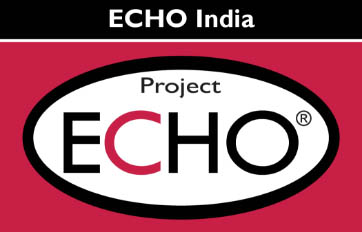Author: Dr. Karan Rai, General Manager, Monitoring, Evaluation, and Research, ECHO India
"I will start delivering awareness sessions in villages, and will try to reach the unreachable. To share the learned knowledge will be part of mission thalassemia," shared a participant, demonstrating the grassroots approach pivotal to the success of the nationwide capacity-building program on the prevention and control of Beta Thalassemia and other Hemoglobinopathies.
Beta Thalassemia, a genetic blood disorder, affects millions of people worldwide. The Global Burden of Disease study (1990-2021) estimates 1,310,407 cases of thalassemia (95% UI: 1,099,973–1,572,220), with an age-standardized prevalence rate (ASPR) of 18.28 per 100,000 individuals (95% UI: 15.29–22.02)[2]. India alone accounts for nearly 25% of the global burden [1]. According to the National Health Mission, in 2016, 10,000-15 were born with Thalassemia major every year [3]. Today, a Hematopoietic Stem Cell Transplant [4], commonly known as Bone Marrow Transplantation (BMT), is the only possible cure for Thalassemia. In contrast, management encompasses blood transfusions and iron chelation therapy with folate (folic acid) supplements.
While the treatments for Hemoglobinopathies have seen significant advancements in recent years, ensuring equitable access remains a key challenge, especially in underserved areas. The theme for World Thalassemia Day 2024, ‘Empowering Lives, Embracing Progress: Equitable and Accessible Thalassemia Treatment for All’ highlighted the need for concerted efforts in promoting accessible care across geographies and socioeconomic strata [5]. A critical step in addressing this barrier is building the capacities of healthcare workers, including doctors, nurses, and allied health professionals, to fortify thalassemia diagnosis, care, and prevention.
Initiated in April 2023, the Post Graduate Institute of Child Health (PGICH) Noida and ECHO India’s collaborative capacity-building intervention aims at enabling medical professionals to adopt a standardized approach to treatment while emphasizing prevention strategies. The program is being implemented in partnership with the Kolkata Municipal Corporation (KMC), Brihanmumbai Municipal Corporation (BMC), and National Health Mission (NHM) Madhya Pradesh. The Indian Academy of Pediatrics (IAP) serves as the academic partner, playing a pivotal role in facilitating knowledge sharing. To date, 326 pediatricians and medical officers have been trained across 58 sessions.
Through targeted education and mentorship sessions, this program has empowered healthcare professionals with the knowledge necessary to tackle the complexities of Beta Thalassemia. Feedback from participants revealed that 93.6% expressed a willingness to recommend the sessions, which was reflective of participants’ satisfaction with the program in enhancing professional skills. Notably, 92.8% of medical officers and 100% of pediatricians underscored their commitment to applying their learnings for improved prevention, detection, and management.
Beyond individual practitioners, the program has catalyzed institutional change, with thalassemia screening and testing becoming standard practices across Urban Primary Health Centers (UPHCs), enabling a proactive shift towards early detection and intervention.
Moreover, the program's emphasis on community engagement and awareness signifies a proactive approach to addressing underlying issues. Medical professionals referring patients to centers with comprehensive treatment facilities and conducting awareness sessions in villages highlight the importance of bridging gaps in access to care and knowledge dissemination. By empowering healthcare professionals to engage actively in community outreach, the program lays the groundwork for sustainable solutions to the challenges posed by hemoglobinopathies.
The nationwide collaborative program has emerged as a source of encouragement in the fight against this genetic disorder. Through education, capacity-building, and community engagement, it has enhanced healthcare professionals' capacity and catalyzed systemic changes aimed at eliminating thalassemia cases. As the program continues to evolve, its impact on public health outcomes is poised to grow, promising a brighter future for individuals affected by beta thalassemia.
References:
[1] Singh P, Shaikh S, Parmar S, Gupta R. Current Status of β-Thalassemic Burden in India. Hemoglobin. 2023 Sep;47(5):181–90.
[2] Tuo Y, Li Y, Li Y, Ma J, Yang X, Wu S, et al. Global, regional, and national burden of thalassemia, 1990–2021: a systematic analysis for the global burden of disease study 2021. eClinicalMedicine [Internet]. 2024 Jun 1 [cited 2024 Aug 9];72. Available from: https://www.thelancet.com/journals/eclinm/article/PIIS2589-5370(24)00198-6/fulltext
[3] NHM_Guidelines_on_Hemoglobinopathies_in_India.pdf [Internet]. [cited 2024 Aug 9]. Available from: https://nhm.gov.in/images/pdf/in-focus/NHM_Guidelines_on_Hemoglobinopathies_in_India.pdf
[4] Khaddour K, Hana CK, Mewawalla P. Hematopoietic Stem Cell Transplantation. In: StatPearls [Internet]. Treasure Island (FL): StatPearls Publishing; 2024 [cited 2024 Aug 9]. Available from: http://www.ncbi.nlm.nih.gov/books/NBK536951/
[5] INTERNATIONAL THALASSAEMIA DAY | Announcing the 2024 Theme! [Internet]. TIF. [cited 2024 Aug 9]. Available from: https://thalassaemia.org.cy/news/itd2024-theme/
